QuestionQUESTION: My 10 week old puppy sleeps well in the crate at night and she is fine in the crate when we laeve the house. Her biting and going potty in the house is causing some concern. Sheis always biting and hanging on to my childrens pants when they are walking by or getting ready for school. How do I train her to behave during the day when we are home? Should she be in the crate when we are in the home also. Also someone is usually home most of the day. She spends about three hours in the crate a few times a week while we are out. My husband is also a sucker for her and he is probably cancelling out my training. Please help,
Corynne
ANSWER: Accidents and damaged possessions are the fault of whoever was watching the puppy. When you are watching it, immediately correct it as soon as it goes for anything except its own toys. In a quiet, but firm voice give it an ''Ah, ah, ah!''. Gently remove what ever and replace it with one of her toys, or if older, hold eye contact until the puppy drops it.
Use the crate only when you must I have a short length of chain fastened to my computer desk. With more mats around the chair mat, this gives a place where the puppy is with me, but about as controlled as in the crate, while still allowing me to get some work done, or at least answer All Experts questions.
Young Labs, which I know best, and other puppies tend to very bad about biting. You see a litter of them, and all the ones that are awake are biting another one or themselves. I am not even sure they realize that when they are alone, if they quit biting, they would quit being bitten. At 3 to 4 months they are getting their adult teeth, and it seems they spend every waking moment biting or chewing. One thing you can do at that stage is to knot and wet a piece of cloth. Then freeze it. The cooling will soothe the gums. Only let the puppy have it when you are there to watch it. I maintain a Lab's favorite chew toy is another Lab. Otherwise they settle for any person they can. They keep hoping to find one that won't yelp, jerk their hand away, and leave.
You just have to keep on correcting them, hundreds of times, not dozens. Provide sturdy, safe toys such as Kongs and Nylabones. Avoid things they can chew pieces off and choke on them. Keep them away from electrical cords. Crates are essential for most young Labs and other dogs.
The pet stores are full of toys that many dogs will quickly chew up into pieces they could choke on or cause intestinal blockages. If you are not there to watch, stick to sturdy stuff such as Nylabones and Kongs. Keep a close eye on chew toys and quickly discard anything that is coming apart in pieces. Rawhide is especially bad because it swells after being swallowed. I don't trust any of the consumable chews. The dogs just gnaw them down to a dangerous size too quickly. These problems are the worst with, but not limited to, large, aggressive chewers such as Labs.
Much of housebreaking is not training the puppy, but making it easier for your puppy, you, and your carpet while its body to catches up to its instincts. At around 8 weeks when the puppy goes to its new home, the time from when it realizes it has to go, and when it can't wait any longer is a matter of seconds. Only time will fix that. You can hardly be expected to be attentive enough to avoid all accidents. There is no sense punishing the puppy for your inattention. It is not fair to punish you either, but you still have to clean it up if you didn't have the puppy outside in time.
Housebreaking starts before you get home with the new puppy. If you don't have a crate, buy one. I prefer the more enclosed, den like plastic ones. Skip the bedding. At first it gets wet, and later it can be chewed into choking hazards. A wire grid in the bottom will help keep the puppy up out of accidents at first. They are available with the crates, but expensive and hard to find. A piece of closely spaced wire closet shelving from a home supply place is cheaper. I am now using a plastic vegetable bin with plenty of holes drilled in the bottom. It helps block off part of the crate for the smaller puppy. If you already have a metal crate, covering it may help. Just make sure you use something the puppy can't pull in and chew. Dogs that start out in crates as little puppies, accept them very well. Never leave an unattended puppy loose in the house. If nobody can watch it, put it in the crate. I suggest letting the dog have its crate all its life. A crate needs to be just big enough for a dog to stretch out in.
Choose a command and spot you want it to use. The less accessible to strays, the less chance of serious disease. If it is a female, choosing a non grassy spot will avoid brown spots later. When you bring it home, take it to the spot and give it the command in a firm, but friendly voice. Keep repeating the command and let the puppy sniff around. If it does anything, praise it. Really let it know what a good dog it is and how much you love it, and maybe a treat. Note, being out there not only means you can praise it, but it also keeps it from being snatched by a hawk. If it doesn't go, take it inside and give it a drink and any meals scheduled. A young puppy will need to go out immediately afterward. Go to the spot and follow the above routine. Praising it if it goes is extremely important. If it doesn't go, take it back inside and put it in its crate and try again soon. Do not let it loose in the house until it does go.
At first it is your responsibility to know and take the puppy out when it needs to go. It needs to go out the first thing in the morning, after eating, drinking, and sleeping. If it quits playing, and starts running around sniffing, it is looking for a place to go. Take it out quickly. You will just have to be what I call puppy broke until it is a little older. How successful you are depends on how attentive you are.
By the time most dogs are about 3 months old, they have figured out that if they go to the door and stand, you will let them out. The praise slowly shifts to going to the door. Some people hang a bell there for the dog to paw. If your dog doesn't figure this out, try praising it and putting it out if it even gets near the door. When you catch it in the act, give it a sharp ''Ah, ah, ah!'' and take it out. Clean up accidents promptly. I mostly keep the little puppies out of the carpeted rooms. Still I need the can of carpet foam sometimes. First blot up all the urine you can with a dry towel. Keep moving it and stepping on it until a fresh area stays dry. A couple big putty knives work well on bowel movements. Just slide one under it while holding it with the other. This gets it up with a minimum of pushing it down into the carpet. This works with even relatively soft ones, vomit, dirt from over turned house plants, or anything else from solids to thick liquids. Finish up with a good shot of carpet foam. Note, do not let the puppy lick up the carpet foam. Once the dog is reliably housebroken, your carpet may need a good steam cleaning.
Many people strongly strongly push cleaning up all evidence of past accidents. I am slower to suggest that. Dogs will return to the same spot if they can find it. When you see one sniffing the spot, that is your clue to run it out.
---------- FOLLOW-UP ----------
QUESTION: I understand this method of watching the pup at all times. However when children need to be fed and taken care of or when breakfast needs to be made trouble occurs. I can't keep my eye on her all day I have household work to do plus children to care for. I am wondering what I should do when I have to care for the home and the children. Of course she is good when I am sitting right with her watching her every move but that is not usually possible
AnswerThere is nothing wrong with popping the puppy in the crate while you are tied up with children or otherwise busy. It is the best I have long wondered how people manage with little children and puppies in the house at the same time. Now that she is a new mother, I am supporting my daughter's decision not to raise another puppy right now.

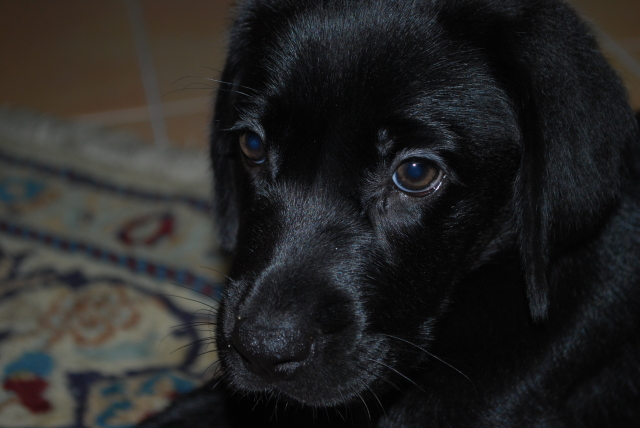 Labrador behaviour
Question
Gordie
Name: Gordie
Age: 4 months
Sex: Male
N
Labrador behaviour
Question
Gordie
Name: Gordie
Age: 4 months
Sex: Male
N
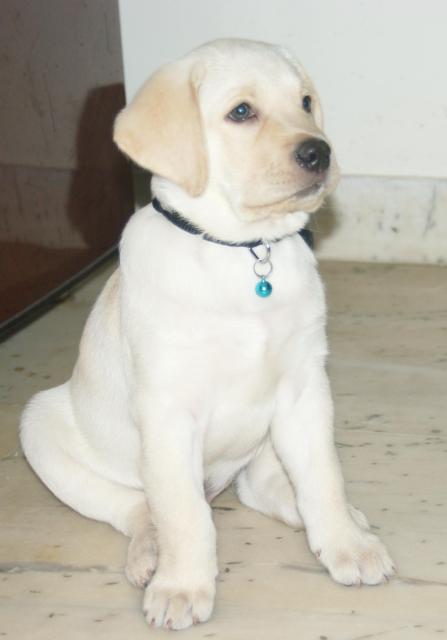 Need opinion about my Labrador Retriever
QuestionCoco (Labrador Retriev
QUESTION: I have
Need opinion about my Labrador Retriever
QuestionCoco (Labrador Retriev
QUESTION: I have
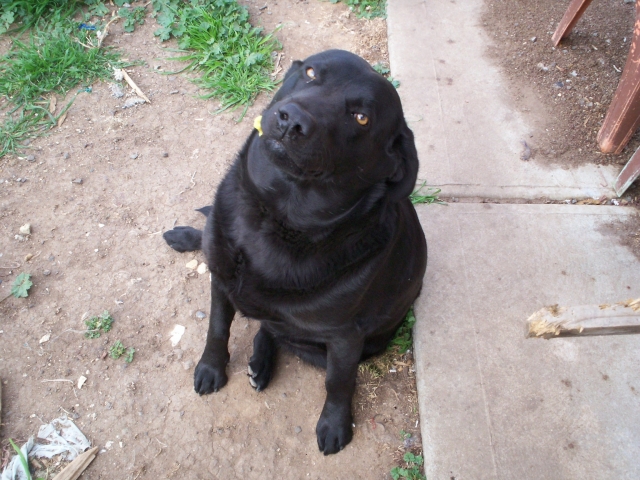 lab healthy weight
Question
Cassie
I have a black lab and she is now 3 1/2
lab healthy weight
Question
Cassie
I have a black lab and she is now 3 1/2
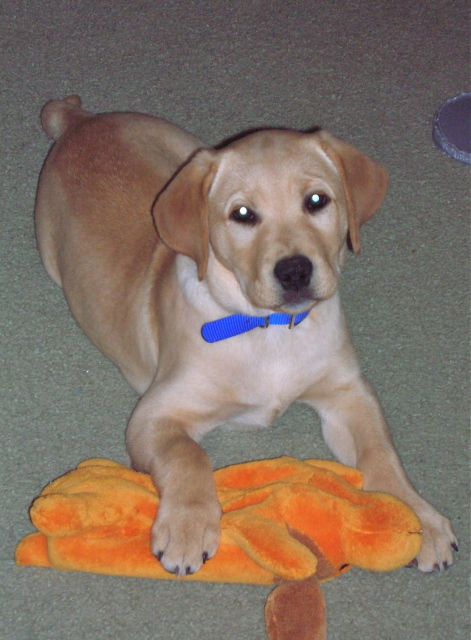 constant puppy barking
Question
My 13 week old female yellow lab barks consta
constant puppy barking
Question
My 13 week old female yellow lab barks consta
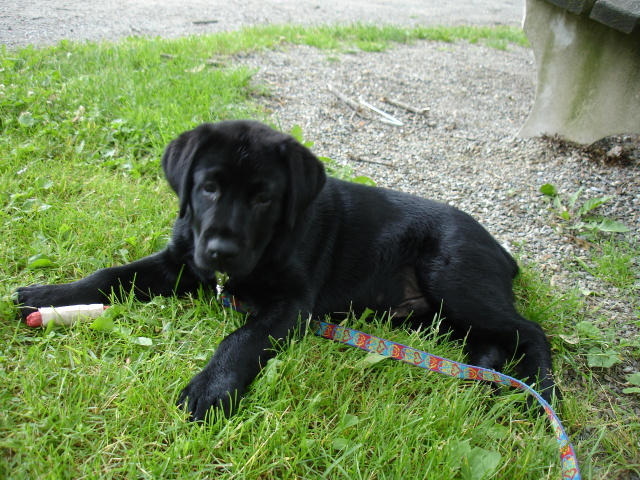 Is my lab puppy growing to fast?
Questionjust hanging out!
QUESTION: I recently t
Is my lab puppy growing to fast?
Questionjust hanging out!
QUESTION: I recently t